Business Law Assignment: Agency, Corporate Law, and Liability Analysis
VerifiedAdded on 2021/06/18
|9
|2584
|135
Homework Assignment
AI Summary
This Business Law assignment solution addresses two main scenarios. The first focuses on agency law, exploring issues of undisclosed principals, usual authority, and ostensible authority through case studies involving a jewelry designer, a gold supplier, and diamond purchases. The analysis examines the liabilities of the principal and agent in various contractual situations. The second scenario examines corporate law, specifically the doctrine of separate legal entity, and whether an individual can be held personally liable for company debts. It also explores the legality of a company license application when the director has a criminal record, referencing relevant sections of the Corporations Act 2001 (Cth). The assignment provides detailed explanations, legal principles, and applications to the given facts.

Running head: BUSINESS LAW
Business law
Name of the Student
Name of the University
Author Note
Business law
Name of the Student
Name of the University
Author Note
Paraphrase This Document
Need a fresh take? Get an instant paraphrase of this document with our AI Paraphraser
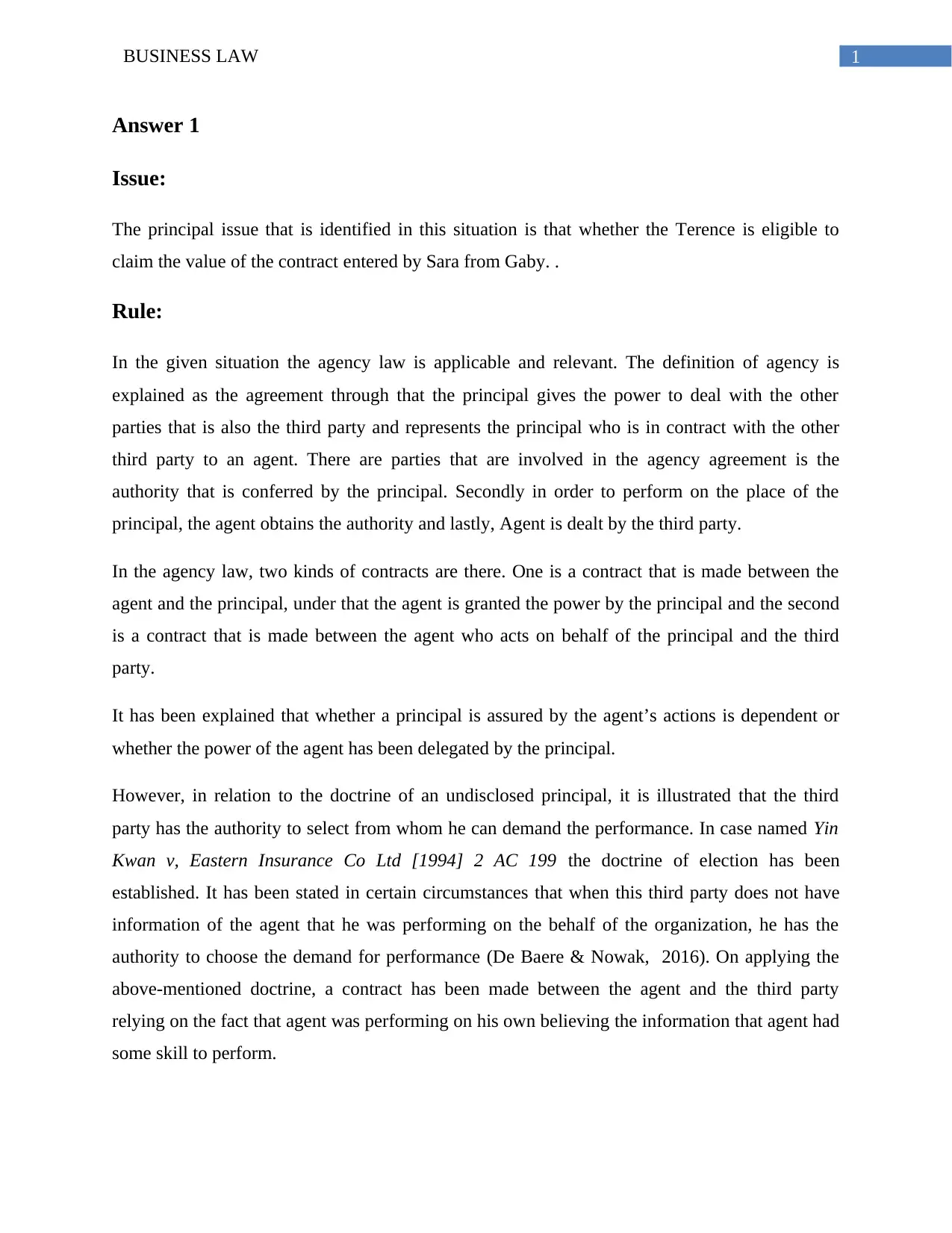
1BUSINESS LAW
Answer 1
Issue:
The principal issue that is identified in this situation is that whether the Terence is eligible to
claim the value of the contract entered by Sara from Gaby. .
Rule:
In the given situation the agency law is applicable and relevant. The definition of agency is
explained as the agreement through that the principal gives the power to deal with the other
parties that is also the third party and represents the principal who is in contract with the other
third party to an agent. There are parties that are involved in the agency agreement is the
authority that is conferred by the principal. Secondly in order to perform on the place of the
principal, the agent obtains the authority and lastly, Agent is dealt by the third party.
In the agency law, two kinds of contracts are there. One is a contract that is made between the
agent and the principal, under that the agent is granted the power by the principal and the second
is a contract that is made between the agent who acts on behalf of the principal and the third
party.
It has been explained that whether a principal is assured by the agent’s actions is dependent or
whether the power of the agent has been delegated by the principal.
However, in relation to the doctrine of an undisclosed principal, it is illustrated that the third
party has the authority to select from whom he can demand the performance. In case named Yin
Kwan v, Eastern Insurance Co Ltd [1994] 2 AC 199 the doctrine of election has been
established. It has been stated in certain circumstances that when this third party does not have
information of the agent that he was performing on the behalf of the organization, he has the
authority to choose the demand for performance (De Baere & Nowak, 2016). On applying the
above-mentioned doctrine, a contract has been made between the agent and the third party
relying on the fact that agent was performing on his own believing the information that agent had
some skill to perform.
Answer 1
Issue:
The principal issue that is identified in this situation is that whether the Terence is eligible to
claim the value of the contract entered by Sara from Gaby. .
Rule:
In the given situation the agency law is applicable and relevant. The definition of agency is
explained as the agreement through that the principal gives the power to deal with the other
parties that is also the third party and represents the principal who is in contract with the other
third party to an agent. There are parties that are involved in the agency agreement is the
authority that is conferred by the principal. Secondly in order to perform on the place of the
principal, the agent obtains the authority and lastly, Agent is dealt by the third party.
In the agency law, two kinds of contracts are there. One is a contract that is made between the
agent and the principal, under that the agent is granted the power by the principal and the second
is a contract that is made between the agent who acts on behalf of the principal and the third
party.
It has been explained that whether a principal is assured by the agent’s actions is dependent or
whether the power of the agent has been delegated by the principal.
However, in relation to the doctrine of an undisclosed principal, it is illustrated that the third
party has the authority to select from whom he can demand the performance. In case named Yin
Kwan v, Eastern Insurance Co Ltd [1994] 2 AC 199 the doctrine of election has been
established. It has been stated in certain circumstances that when this third party does not have
information of the agent that he was performing on the behalf of the organization, he has the
authority to choose the demand for performance (De Baere & Nowak, 2016). On applying the
above-mentioned doctrine, a contract has been made between the agent and the third party
relying on the fact that agent was performing on his own believing the information that agent had
some skill to perform.
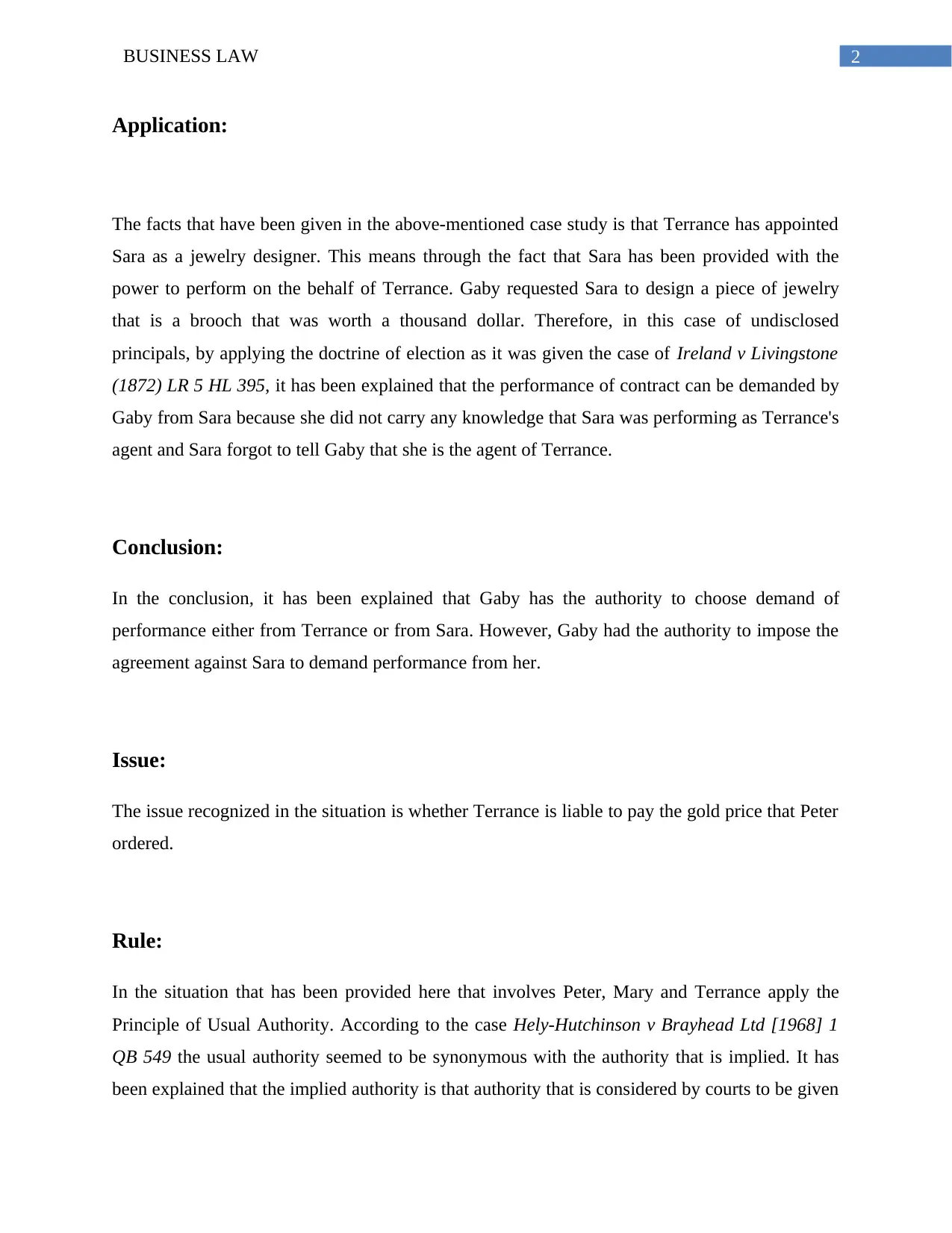
2BUSINESS LAW
Application:
The facts that have been given in the above-mentioned case study is that Terrance has appointed
Sara as a jewelry designer. This means through the fact that Sara has been provided with the
power to perform on the behalf of Terrance. Gaby requested Sara to design a piece of jewelry
that is a brooch that was worth a thousand dollar. Therefore, in this case of undisclosed
principals, by applying the doctrine of election as it was given the case of Ireland v Livingstone
(1872) LR 5 HL 395, it has been explained that the performance of contract can be demanded by
Gaby from Sara because she did not carry any knowledge that Sara was performing as Terrance's
agent and Sara forgot to tell Gaby that she is the agent of Terrance.
Conclusion:
In the conclusion, it has been explained that Gaby has the authority to choose demand of
performance either from Terrance or from Sara. However, Gaby had the authority to impose the
agreement against Sara to demand performance from her.
Issue:
The issue recognized in the situation is whether Terrance is liable to pay the gold price that Peter
ordered.
Rule:
In the situation that has been provided here that involves Peter, Mary and Terrance apply the
Principle of Usual Authority. According to the case Hely-Hutchinson v Brayhead Ltd [1968] 1
QB 549 the usual authority seemed to be synonymous with the authority that is implied. It has
been explained that the implied authority is that authority that is considered by courts to be given
Application:
The facts that have been given in the above-mentioned case study is that Terrance has appointed
Sara as a jewelry designer. This means through the fact that Sara has been provided with the
power to perform on the behalf of Terrance. Gaby requested Sara to design a piece of jewelry
that is a brooch that was worth a thousand dollar. Therefore, in this case of undisclosed
principals, by applying the doctrine of election as it was given the case of Ireland v Livingstone
(1872) LR 5 HL 395, it has been explained that the performance of contract can be demanded by
Gaby from Sara because she did not carry any knowledge that Sara was performing as Terrance's
agent and Sara forgot to tell Gaby that she is the agent of Terrance.
Conclusion:
In the conclusion, it has been explained that Gaby has the authority to choose demand of
performance either from Terrance or from Sara. However, Gaby had the authority to impose the
agreement against Sara to demand performance from her.
Issue:
The issue recognized in the situation is whether Terrance is liable to pay the gold price that Peter
ordered.
Rule:
In the situation that has been provided here that involves Peter, Mary and Terrance apply the
Principle of Usual Authority. According to the case Hely-Hutchinson v Brayhead Ltd [1968] 1
QB 549 the usual authority seemed to be synonymous with the authority that is implied. It has
been explained that the implied authority is that authority that is considered by courts to be given
⊘ This is a preview!⊘
Do you want full access?
Subscribe today to unlock all pages.

Trusted by 1+ million students worldwide
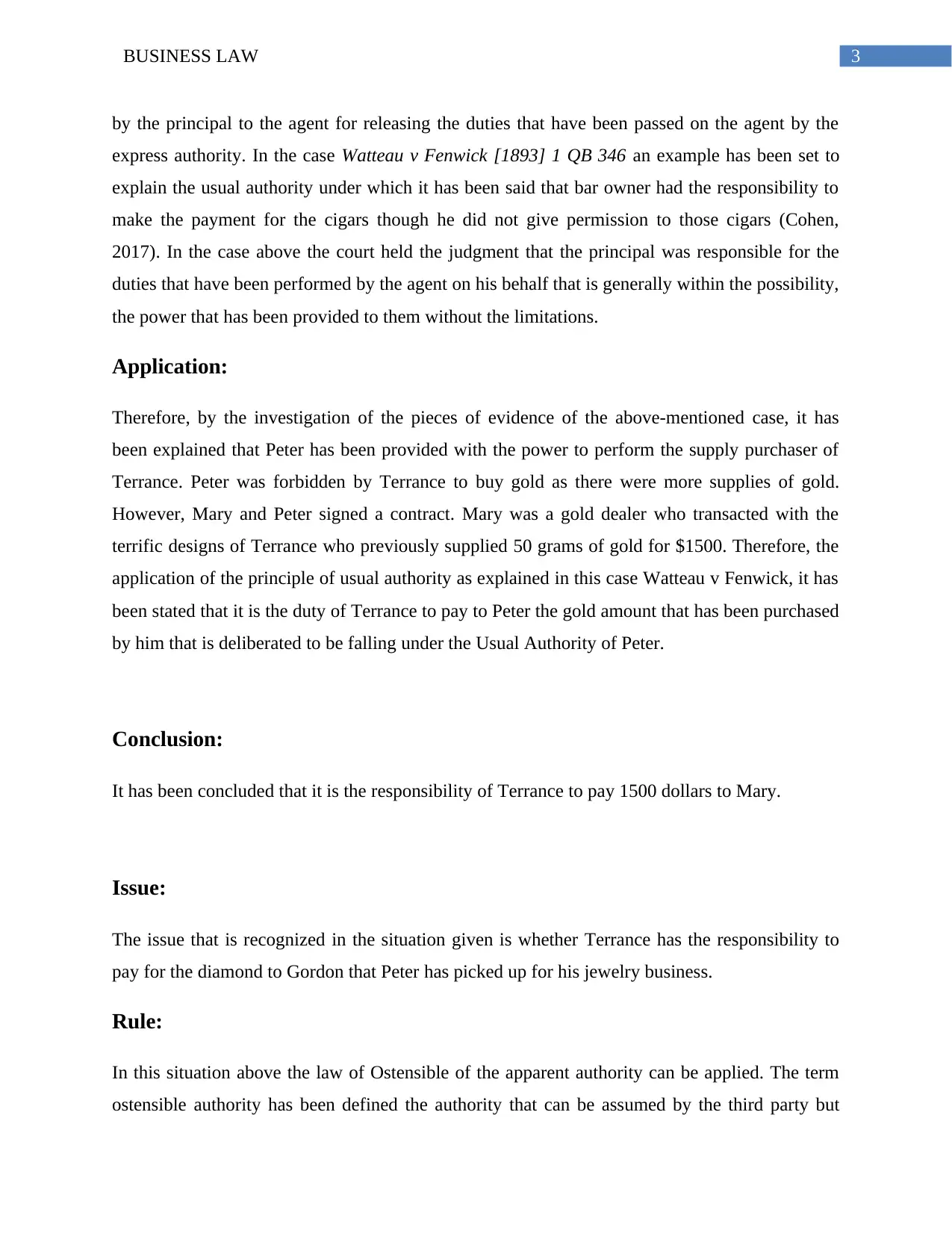
3BUSINESS LAW
by the principal to the agent for releasing the duties that have been passed on the agent by the
express authority. In the case Watteau v Fenwick [1893] 1 QB 346 an example has been set to
explain the usual authority under which it has been said that bar owner had the responsibility to
make the payment for the cigars though he did not give permission to those cigars (Cohen,
2017). In the case above the court held the judgment that the principal was responsible for the
duties that have been performed by the agent on his behalf that is generally within the possibility,
the power that has been provided to them without the limitations.
Application:
Therefore, by the investigation of the pieces of evidence of the above-mentioned case, it has
been explained that Peter has been provided with the power to perform the supply purchaser of
Terrance. Peter was forbidden by Terrance to buy gold as there were more supplies of gold.
However, Mary and Peter signed a contract. Mary was a gold dealer who transacted with the
terrific designs of Terrance who previously supplied 50 grams of gold for $1500. Therefore, the
application of the principle of usual authority as explained in this case Watteau v Fenwick, it has
been stated that it is the duty of Terrance to pay to Peter the gold amount that has been purchased
by him that is deliberated to be falling under the Usual Authority of Peter.
Conclusion:
It has been concluded that it is the responsibility of Terrance to pay 1500 dollars to Mary.
Issue:
The issue that is recognized in the situation given is whether Terrance has the responsibility to
pay for the diamond to Gordon that Peter has picked up for his jewelry business.
Rule:
In this situation above the law of Ostensible of the apparent authority can be applied. The term
ostensible authority has been defined the authority that can be assumed by the third party but
by the principal to the agent for releasing the duties that have been passed on the agent by the
express authority. In the case Watteau v Fenwick [1893] 1 QB 346 an example has been set to
explain the usual authority under which it has been said that bar owner had the responsibility to
make the payment for the cigars though he did not give permission to those cigars (Cohen,
2017). In the case above the court held the judgment that the principal was responsible for the
duties that have been performed by the agent on his behalf that is generally within the possibility,
the power that has been provided to them without the limitations.
Application:
Therefore, by the investigation of the pieces of evidence of the above-mentioned case, it has
been explained that Peter has been provided with the power to perform the supply purchaser of
Terrance. Peter was forbidden by Terrance to buy gold as there were more supplies of gold.
However, Mary and Peter signed a contract. Mary was a gold dealer who transacted with the
terrific designs of Terrance who previously supplied 50 grams of gold for $1500. Therefore, the
application of the principle of usual authority as explained in this case Watteau v Fenwick, it has
been stated that it is the duty of Terrance to pay to Peter the gold amount that has been purchased
by him that is deliberated to be falling under the Usual Authority of Peter.
Conclusion:
It has been concluded that it is the responsibility of Terrance to pay 1500 dollars to Mary.
Issue:
The issue that is recognized in the situation given is whether Terrance has the responsibility to
pay for the diamond to Gordon that Peter has picked up for his jewelry business.
Rule:
In this situation above the law of Ostensible of the apparent authority can be applied. The term
ostensible authority has been defined the authority that can be assumed by the third party but
Paraphrase This Document
Need a fresh take? Get an instant paraphrase of this document with our AI Paraphraser
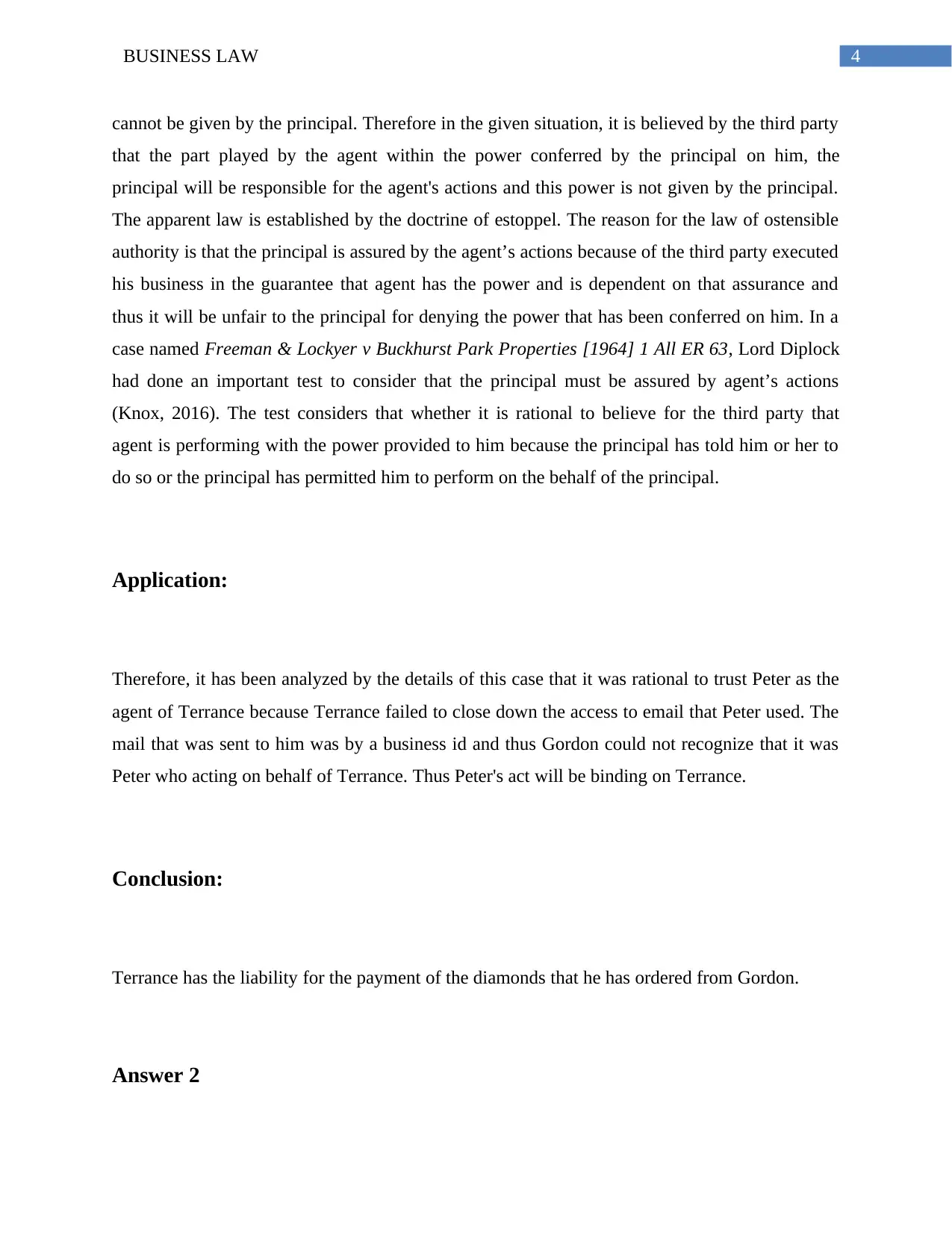
4BUSINESS LAW
cannot be given by the principal. Therefore in the given situation, it is believed by the third party
that the part played by the agent within the power conferred by the principal on him, the
principal will be responsible for the agent's actions and this power is not given by the principal.
The apparent law is established by the doctrine of estoppel. The reason for the law of ostensible
authority is that the principal is assured by the agent’s actions because of the third party executed
his business in the guarantee that agent has the power and is dependent on that assurance and
thus it will be unfair to the principal for denying the power that has been conferred on him. In a
case named Freeman & Lockyer v Buckhurst Park Properties [1964] 1 All ER 63, Lord Diplock
had done an important test to consider that the principal must be assured by agent’s actions
(Knox, 2016). The test considers that whether it is rational to believe for the third party that
agent is performing with the power provided to him because the principal has told him or her to
do so or the principal has permitted him to perform on the behalf of the principal.
Application:
Therefore, it has been analyzed by the details of this case that it was rational to trust Peter as the
agent of Terrance because Terrance failed to close down the access to email that Peter used. The
mail that was sent to him was by a business id and thus Gordon could not recognize that it was
Peter who acting on behalf of Terrance. Thus Peter's act will be binding on Terrance.
Conclusion:
Terrance has the liability for the payment of the diamonds that he has ordered from Gordon.
Answer 2
cannot be given by the principal. Therefore in the given situation, it is believed by the third party
that the part played by the agent within the power conferred by the principal on him, the
principal will be responsible for the agent's actions and this power is not given by the principal.
The apparent law is established by the doctrine of estoppel. The reason for the law of ostensible
authority is that the principal is assured by the agent’s actions because of the third party executed
his business in the guarantee that agent has the power and is dependent on that assurance and
thus it will be unfair to the principal for denying the power that has been conferred on him. In a
case named Freeman & Lockyer v Buckhurst Park Properties [1964] 1 All ER 63, Lord Diplock
had done an important test to consider that the principal must be assured by agent’s actions
(Knox, 2016). The test considers that whether it is rational to believe for the third party that
agent is performing with the power provided to him because the principal has told him or her to
do so or the principal has permitted him to perform on the behalf of the principal.
Application:
Therefore, it has been analyzed by the details of this case that it was rational to trust Peter as the
agent of Terrance because Terrance failed to close down the access to email that Peter used. The
mail that was sent to him was by a business id and thus Gordon could not recognize that it was
Peter who acting on behalf of Terrance. Thus Peter's act will be binding on Terrance.
Conclusion:
Terrance has the liability for the payment of the diamonds that he has ordered from Gordon.
Answer 2
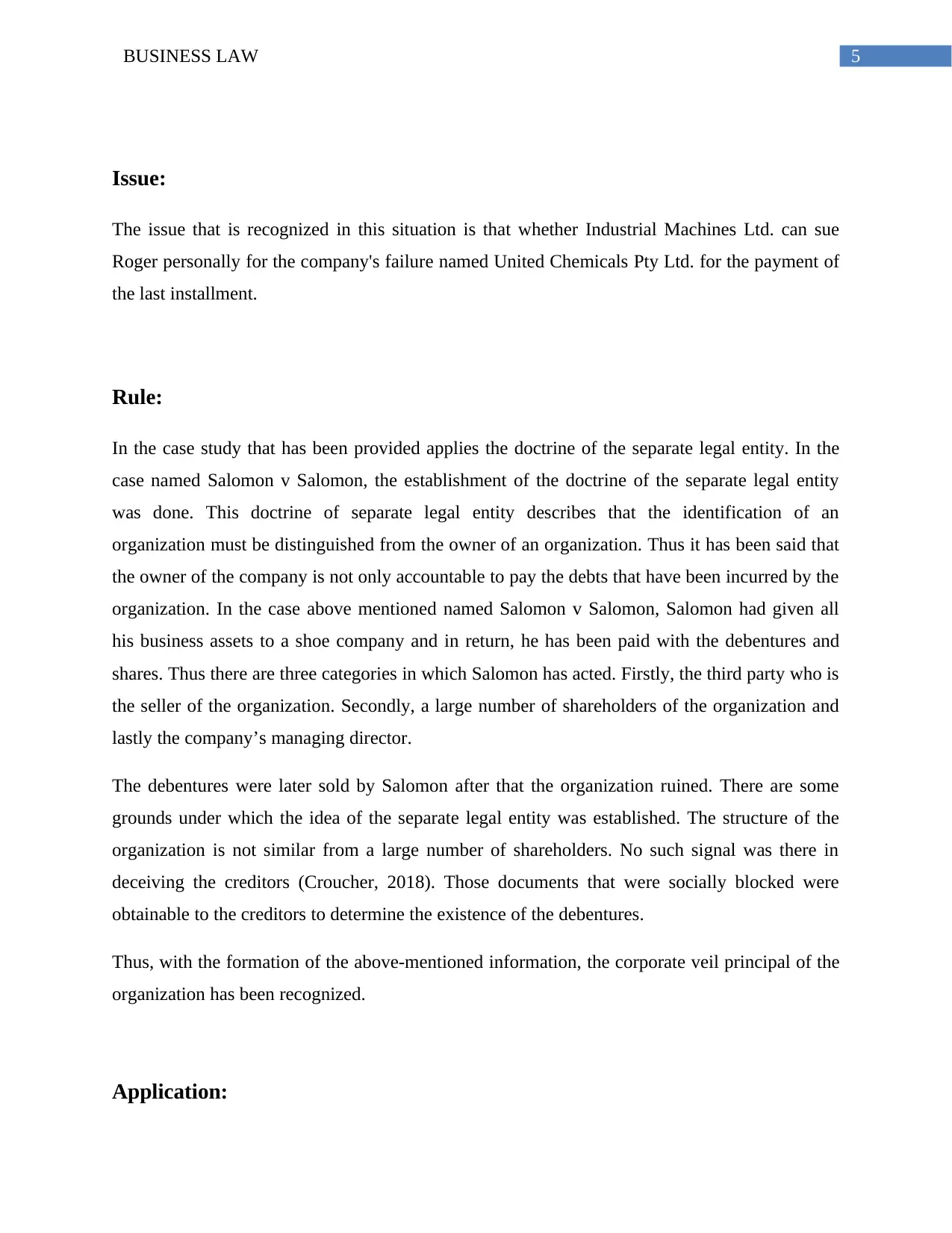
5BUSINESS LAW
Issue:
The issue that is recognized in this situation is that whether Industrial Machines Ltd. can sue
Roger personally for the company's failure named United Chemicals Pty Ltd. for the payment of
the last installment.
Rule:
In the case study that has been provided applies the doctrine of the separate legal entity. In the
case named Salomon v Salomon, the establishment of the doctrine of the separate legal entity
was done. This doctrine of separate legal entity describes that the identification of an
organization must be distinguished from the owner of an organization. Thus it has been said that
the owner of the company is not only accountable to pay the debts that have been incurred by the
organization. In the case above mentioned named Salomon v Salomon, Salomon had given all
his business assets to a shoe company and in return, he has been paid with the debentures and
shares. Thus there are three categories in which Salomon has acted. Firstly, the third party who is
the seller of the organization. Secondly, a large number of shareholders of the organization and
lastly the company’s managing director.
The debentures were later sold by Salomon after that the organization ruined. There are some
grounds under which the idea of the separate legal entity was established. The structure of the
organization is not similar from a large number of shareholders. No such signal was there in
deceiving the creditors (Croucher, 2018). Those documents that were socially blocked were
obtainable to the creditors to determine the existence of the debentures.
Thus, with the formation of the above-mentioned information, the corporate veil principal of the
organization has been recognized.
Application:
Issue:
The issue that is recognized in this situation is that whether Industrial Machines Ltd. can sue
Roger personally for the company's failure named United Chemicals Pty Ltd. for the payment of
the last installment.
Rule:
In the case study that has been provided applies the doctrine of the separate legal entity. In the
case named Salomon v Salomon, the establishment of the doctrine of the separate legal entity
was done. This doctrine of separate legal entity describes that the identification of an
organization must be distinguished from the owner of an organization. Thus it has been said that
the owner of the company is not only accountable to pay the debts that have been incurred by the
organization. In the case above mentioned named Salomon v Salomon, Salomon had given all
his business assets to a shoe company and in return, he has been paid with the debentures and
shares. Thus there are three categories in which Salomon has acted. Firstly, the third party who is
the seller of the organization. Secondly, a large number of shareholders of the organization and
lastly the company’s managing director.
The debentures were later sold by Salomon after that the organization ruined. There are some
grounds under which the idea of the separate legal entity was established. The structure of the
organization is not similar from a large number of shareholders. No such signal was there in
deceiving the creditors (Croucher, 2018). Those documents that were socially blocked were
obtainable to the creditors to determine the existence of the debentures.
Thus, with the formation of the above-mentioned information, the corporate veil principal of the
organization has been recognized.
Application:
⊘ This is a preview!⊘
Do you want full access?
Subscribe today to unlock all pages.

Trusted by 1+ million students worldwide
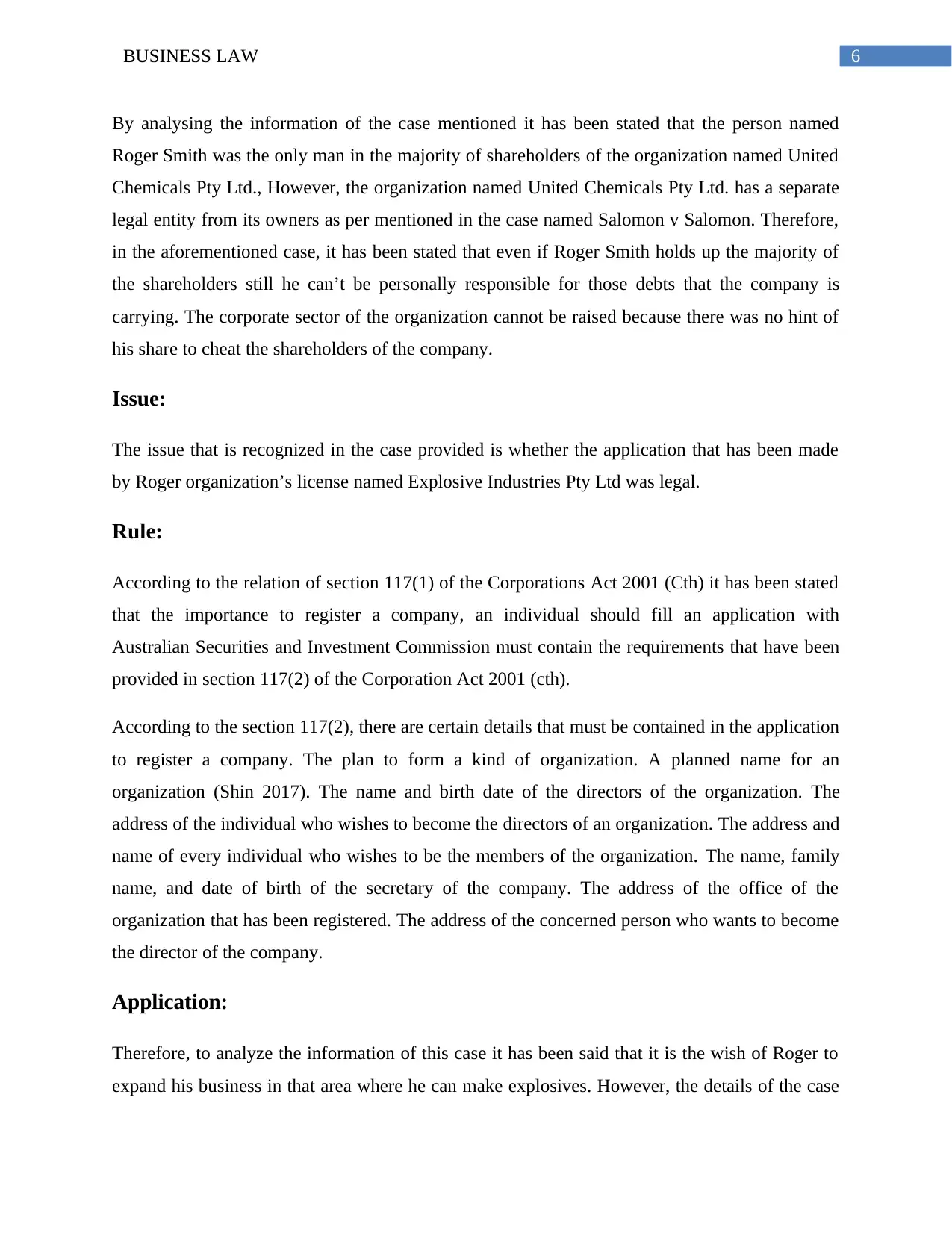
6BUSINESS LAW
By analysing the information of the case mentioned it has been stated that the person named
Roger Smith was the only man in the majority of shareholders of the organization named United
Chemicals Pty Ltd., However, the organization named United Chemicals Pty Ltd. has a separate
legal entity from its owners as per mentioned in the case named Salomon v Salomon. Therefore,
in the aforementioned case, it has been stated that even if Roger Smith holds up the majority of
the shareholders still he can’t be personally responsible for those debts that the company is
carrying. The corporate sector of the organization cannot be raised because there was no hint of
his share to cheat the shareholders of the company.
Issue:
The issue that is recognized in the case provided is whether the application that has been made
by Roger organization’s license named Explosive Industries Pty Ltd was legal.
Rule:
According to the relation of section 117(1) of the Corporations Act 2001 (Cth) it has been stated
that the importance to register a company, an individual should fill an application with
Australian Securities and Investment Commission must contain the requirements that have been
provided in section 117(2) of the Corporation Act 2001 (cth).
According to the section 117(2), there are certain details that must be contained in the application
to register a company. The plan to form a kind of organization. A planned name for an
organization (Shin 2017). The name and birth date of the directors of the organization. The
address of the individual who wishes to become the directors of an organization. The address and
name of every individual who wishes to be the members of the organization. The name, family
name, and date of birth of the secretary of the company. The address of the office of the
organization that has been registered. The address of the concerned person who wants to become
the director of the company.
Application:
Therefore, to analyze the information of this case it has been said that it is the wish of Roger to
expand his business in that area where he can make explosives. However, the details of the case
By analysing the information of the case mentioned it has been stated that the person named
Roger Smith was the only man in the majority of shareholders of the organization named United
Chemicals Pty Ltd., However, the organization named United Chemicals Pty Ltd. has a separate
legal entity from its owners as per mentioned in the case named Salomon v Salomon. Therefore,
in the aforementioned case, it has been stated that even if Roger Smith holds up the majority of
the shareholders still he can’t be personally responsible for those debts that the company is
carrying. The corporate sector of the organization cannot be raised because there was no hint of
his share to cheat the shareholders of the company.
Issue:
The issue that is recognized in the case provided is whether the application that has been made
by Roger organization’s license named Explosive Industries Pty Ltd was legal.
Rule:
According to the relation of section 117(1) of the Corporations Act 2001 (Cth) it has been stated
that the importance to register a company, an individual should fill an application with
Australian Securities and Investment Commission must contain the requirements that have been
provided in section 117(2) of the Corporation Act 2001 (cth).
According to the section 117(2), there are certain details that must be contained in the application
to register a company. The plan to form a kind of organization. A planned name for an
organization (Shin 2017). The name and birth date of the directors of the organization. The
address of the individual who wishes to become the directors of an organization. The address and
name of every individual who wishes to be the members of the organization. The name, family
name, and date of birth of the secretary of the company. The address of the office of the
organization that has been registered. The address of the concerned person who wants to become
the director of the company.
Application:
Therefore, to analyze the information of this case it has been said that it is the wish of Roger to
expand his business in that area where he can make explosives. However, the details of the case
Paraphrase This Document
Need a fresh take? Get an instant paraphrase of this document with our AI Paraphraser
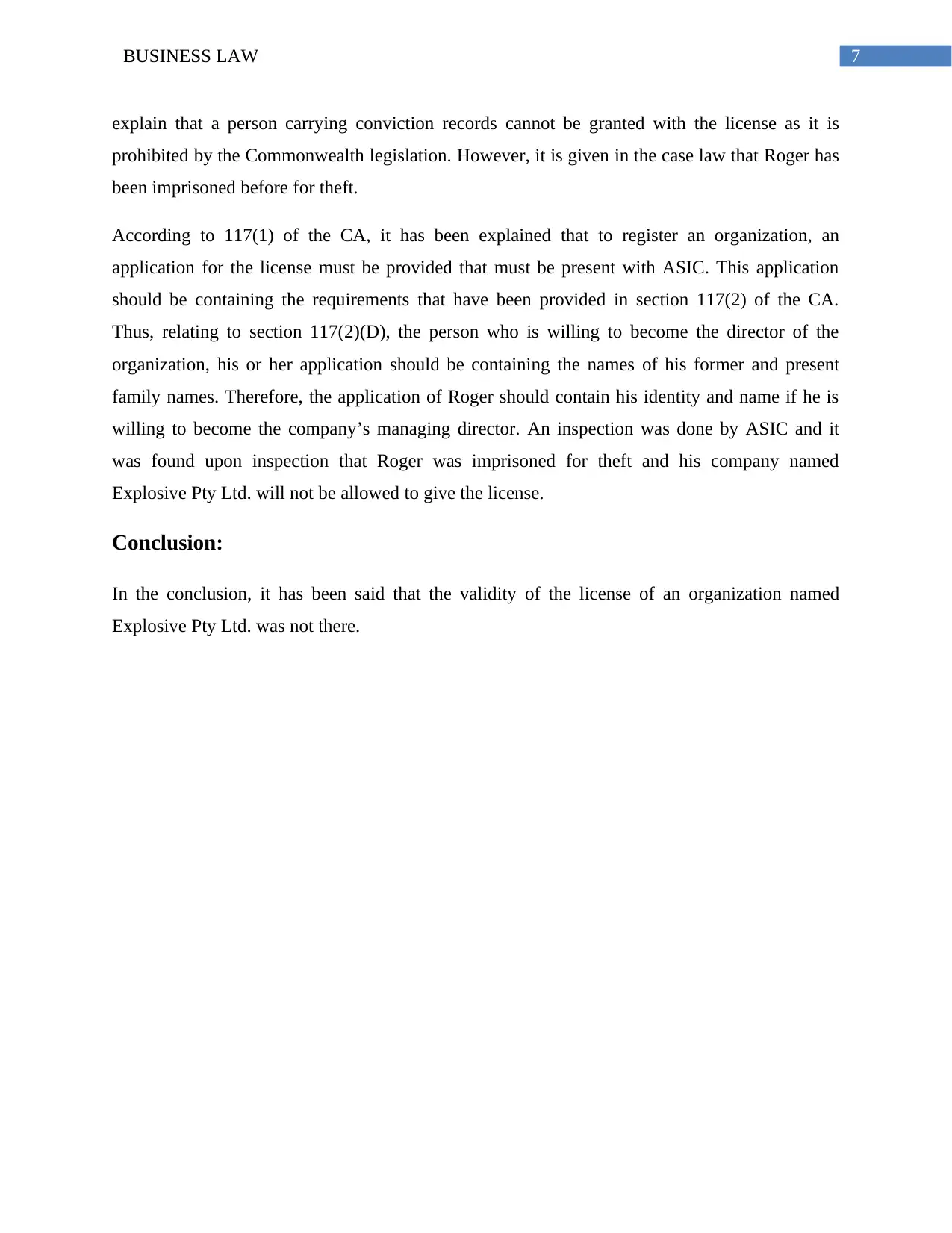
7BUSINESS LAW
explain that a person carrying conviction records cannot be granted with the license as it is
prohibited by the Commonwealth legislation. However, it is given in the case law that Roger has
been imprisoned before for theft.
According to 117(1) of the CA, it has been explained that to register an organization, an
application for the license must be provided that must be present with ASIC. This application
should be containing the requirements that have been provided in section 117(2) of the CA.
Thus, relating to section 117(2)(D), the person who is willing to become the director of the
organization, his or her application should be containing the names of his former and present
family names. Therefore, the application of Roger should contain his identity and name if he is
willing to become the company’s managing director. An inspection was done by ASIC and it
was found upon inspection that Roger was imprisoned for theft and his company named
Explosive Pty Ltd. will not be allowed to give the license.
Conclusion:
In the conclusion, it has been said that the validity of the license of an organization named
Explosive Pty Ltd. was not there.
explain that a person carrying conviction records cannot be granted with the license as it is
prohibited by the Commonwealth legislation. However, it is given in the case law that Roger has
been imprisoned before for theft.
According to 117(1) of the CA, it has been explained that to register an organization, an
application for the license must be provided that must be present with ASIC. This application
should be containing the requirements that have been provided in section 117(2) of the CA.
Thus, relating to section 117(2)(D), the person who is willing to become the director of the
organization, his or her application should be containing the names of his former and present
family names. Therefore, the application of Roger should contain his identity and name if he is
willing to become the company’s managing director. An inspection was done by ASIC and it
was found upon inspection that Roger was imprisoned for theft and his company named
Explosive Pty Ltd. will not be allowed to give the license.
Conclusion:
In the conclusion, it has been said that the validity of the license of an organization named
Explosive Pty Ltd. was not there.
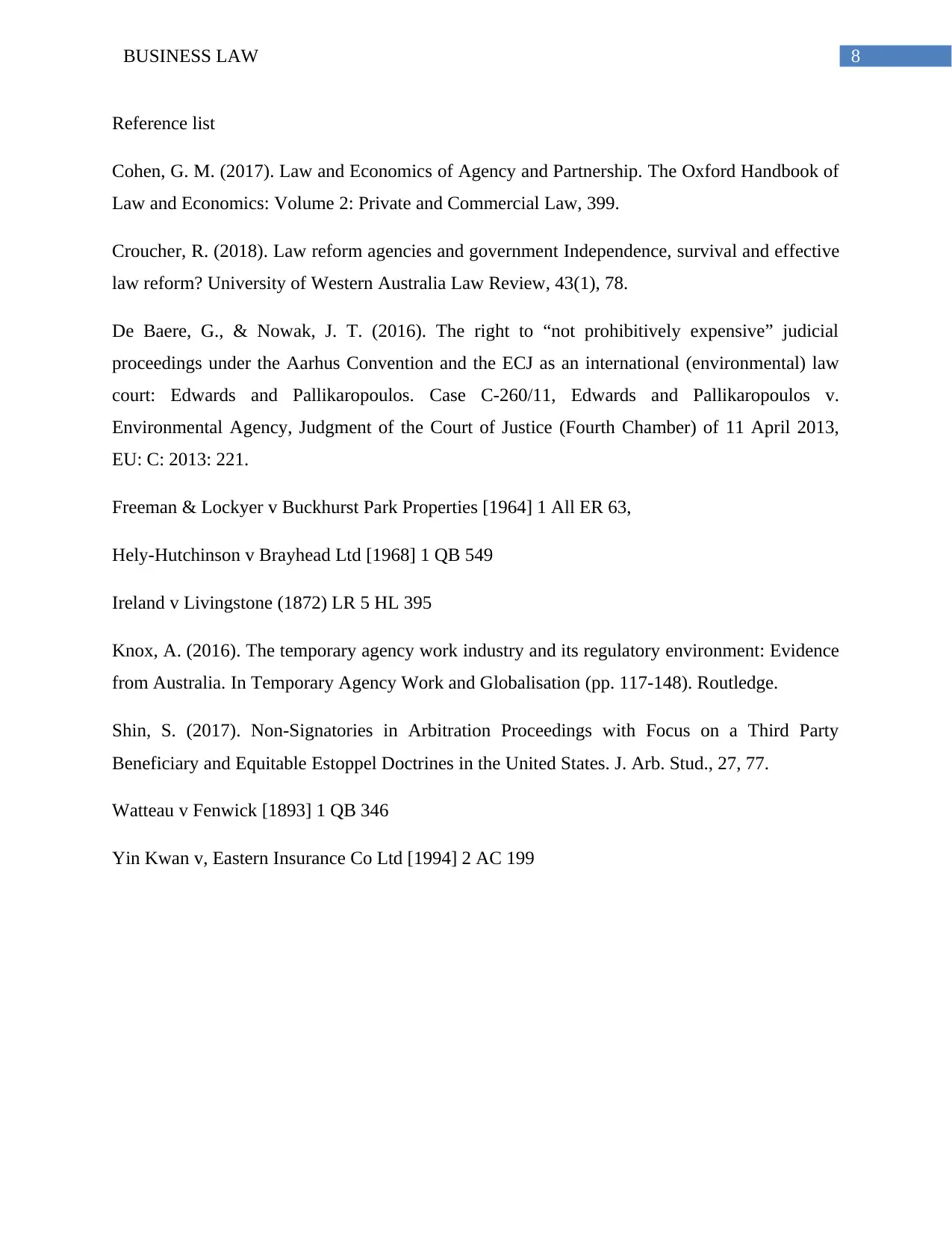
8BUSINESS LAW
Reference list
Cohen, G. M. (2017). Law and Economics of Agency and Partnership. The Oxford Handbook of
Law and Economics: Volume 2: Private and Commercial Law, 399.
Croucher, R. (2018). Law reform agencies and government Independence, survival and effective
law reform? University of Western Australia Law Review, 43(1), 78.
De Baere, G., & Nowak, J. T. (2016). The right to “not prohibitively expensive” judicial
proceedings under the Aarhus Convention and the ECJ as an international (environmental) law
court: Edwards and Pallikaropoulos. Case C-260/11, Edwards and Pallikaropoulos v.
Environmental Agency, Judgment of the Court of Justice (Fourth Chamber) of 11 April 2013,
EU: C: 2013: 221.
Freeman & Lockyer v Buckhurst Park Properties [1964] 1 All ER 63,
Hely-Hutchinson v Brayhead Ltd [1968] 1 QB 549
Ireland v Livingstone (1872) LR 5 HL 395
Knox, A. (2016). The temporary agency work industry and its regulatory environment: Evidence
from Australia. In Temporary Agency Work and Globalisation (pp. 117-148). Routledge.
Shin, S. (2017). Non-Signatories in Arbitration Proceedings with Focus on a Third Party
Beneficiary and Equitable Estoppel Doctrines in the United States. J. Arb. Stud., 27, 77.
Watteau v Fenwick [1893] 1 QB 346
Yin Kwan v, Eastern Insurance Co Ltd [1994] 2 AC 199
Reference list
Cohen, G. M. (2017). Law and Economics of Agency and Partnership. The Oxford Handbook of
Law and Economics: Volume 2: Private and Commercial Law, 399.
Croucher, R. (2018). Law reform agencies and government Independence, survival and effective
law reform? University of Western Australia Law Review, 43(1), 78.
De Baere, G., & Nowak, J. T. (2016). The right to “not prohibitively expensive” judicial
proceedings under the Aarhus Convention and the ECJ as an international (environmental) law
court: Edwards and Pallikaropoulos. Case C-260/11, Edwards and Pallikaropoulos v.
Environmental Agency, Judgment of the Court of Justice (Fourth Chamber) of 11 April 2013,
EU: C: 2013: 221.
Freeman & Lockyer v Buckhurst Park Properties [1964] 1 All ER 63,
Hely-Hutchinson v Brayhead Ltd [1968] 1 QB 549
Ireland v Livingstone (1872) LR 5 HL 395
Knox, A. (2016). The temporary agency work industry and its regulatory environment: Evidence
from Australia. In Temporary Agency Work and Globalisation (pp. 117-148). Routledge.
Shin, S. (2017). Non-Signatories in Arbitration Proceedings with Focus on a Third Party
Beneficiary and Equitable Estoppel Doctrines in the United States. J. Arb. Stud., 27, 77.
Watteau v Fenwick [1893] 1 QB 346
Yin Kwan v, Eastern Insurance Co Ltd [1994] 2 AC 199
⊘ This is a preview!⊘
Do you want full access?
Subscribe today to unlock all pages.

Trusted by 1+ million students worldwide
1 out of 9
Related Documents
Your All-in-One AI-Powered Toolkit for Academic Success.
+13062052269
info@desklib.com
Available 24*7 on WhatsApp / Email
![[object Object]](/_next/static/media/star-bottom.7253800d.svg)
Unlock your academic potential
Copyright © 2020–2026 A2Z Services. All Rights Reserved. Developed and managed by ZUCOL.




